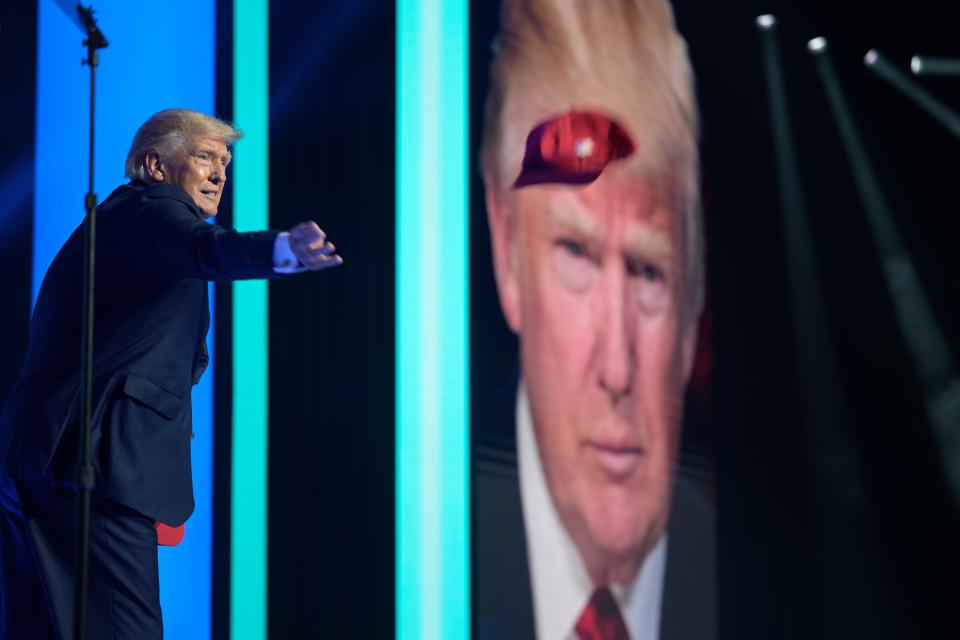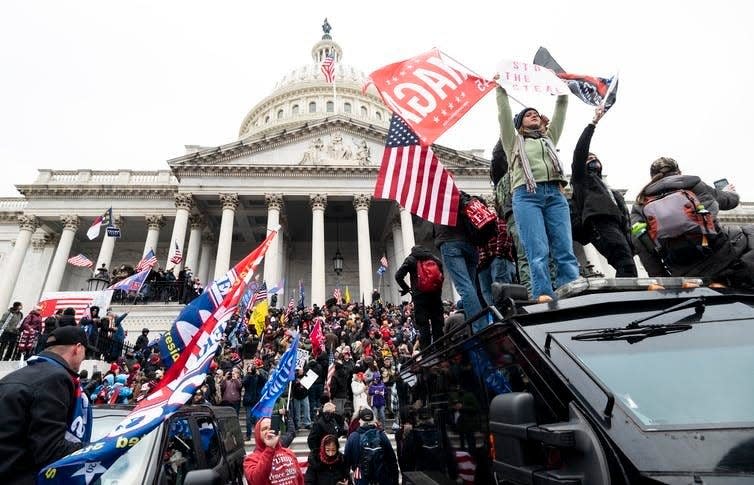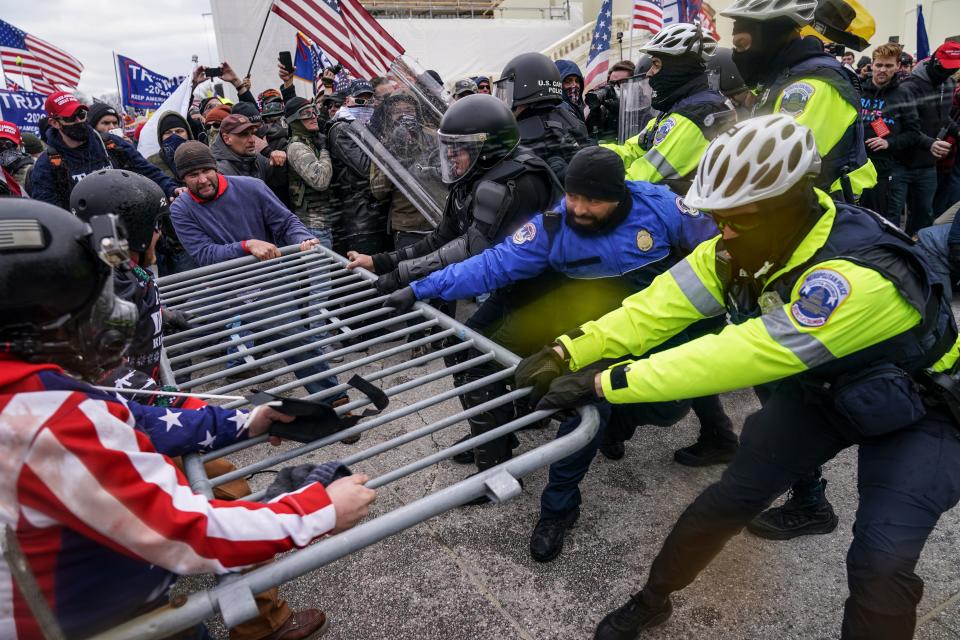Third anniversary of Jan. 6 attack at the Capitol finds Trump, U.S. in high stakes juncture
- Oops!Something went wrong.Please try again later.
- Oops!Something went wrong.Please try again later.
The third anniversary of the Jan. 6 violence at the U.S. Capitol finds the country gripped by what arguably ranks among the most high-stakes political, legal and constitutional junctures in America's history.
At the center of the vortex is former President Donald Trump, the Palm Beach resident who is the polls-leading candidate for the 2024 Republican nomination. That is, if he is allowed to seek the White House for a third time.
Officials and courts in two states, Colorado and Maine, have disqualified Trump from running for the highest office in the land in those jurisdictions, and similar challenges are before as many as 30 other states. This week, attempts to block Trump from the ballot were filed in Illinois and Massachusetts.
The common denominator in all those filings is a hotly debated section in the 14th Amendment. That provision states that citizens who have sworn an oath when accepting a federal position and then engaged in insurrection against the U.S. government are disqualified from ever serving again.
Since last summer, the arguments for and against applying the constitutional clause against Trump have been as intense as those over border security, military aid to Ukraine and the Israel-Hamas war.
Now the dispute has gone from legal hypotheses to reality for election ballots. One elections-law expert allows the question is "legitimate" but needs to be decided pronto — and by the U.S. Supreme Court — as the primary and caucus calendar is at hand, deadlines for printing ballots are fast approaching and voters as well as party officials need to know if Trump is eligible or not.
"The best thing that is happening out of all of this, regardless of whether you think Donald Trump should be disqualified or not, is that this is a legitimate legal issue and it needs to be decided on its merits as soon as possible," said David Becker, executive director and founder of the nonpartisan, nonprofit Center for Election Innovation & Research.
Trump, who also is facing four felony counts related to the Jan. 6 episode on Capitol Hill, claims he is not only immune from prosecution but also from 14th Amendment consequences because he was acting within his capacity as president.
More: Trump paid me to find voter fraud. Then he lied after I found 2020 election wasn't stolen.
It's a claim that has drawn widespread rebuke, even from those who once defended him.
"No man is above the law. That is fundamentally the American approach to freedom and governments, and it is essential that it be maintained," said Ty Cobb, who served as special White House counsel and represented Trump during special counsel Robert Mueller's investigation. "Trump's arguments that he acted in his official duties are sadly frivolous."
What's at stake now, some argue, is no less than asking whether the U.S. Constitution remains relevant as the law of the land.
"The Constitution isn't optional. Enforcing the Constitution isn't optional. It's a legal obligation," said Liz Hempowicz at the Washington, D.C., Project On Government Oversight. "To suggest enforcing a provision of the Constitution is undemocratic is just antithetical to the rule of law in our country."
Trump camp claims Biden's actions 'threaten our democracy and the American way of life'
The third anniversary of the attack on the U.S. Capitol has a very different tone, principally because Trump's impunity seems to have withered. Last year he was charged with four felonies related to the Jan. 6 insurrection and 14th Amendment disqualification actions have gained traction.
But Trump is still by far the favorite to win the GOP nomination, and the vast majority of 14th Amendment determinations so far have been in his favor, including one in Florida.
In social media posts, interviews, town halls and rally speeches, he has virulently attacked the charges and disqualification efforts as the work of "deranged" special prosecutor Jack Smith and political foes that he has often referred to as an assemblage of the "radical left," plus "communists, Marxists and fascists" bent on leading the country into "hell."

On Jan. 1, Trump issued a trio of missives on his Truth Social platform insisting that "first of all, I did nothing wrong" and that "what I was doing was bringing to light the fact that the Election was, without question, Rigged and Stolen" within his "duty" as president.
On Friday, Jan. 5, Trump's Make America Great Again Inc. organization issued a statement saying the threat to American democracy is the Biden administration.
The statement read: "Since taking office, Joe Biden has taken actions that threaten our democracy and the American way of life. Biden has abused his power to target critics, activists, concerned parents, and his main political opponent, President Donald Trump. Americans will reject Biden's divisive policies when they re-elect President Trump next November to make America safe, strong, and prosperous again."
Watchdog: 'Risk' lies is not applying 14th Amendment, Constitution's provisions
Nonetheless, it is Trump who is most at risk of being knocked off ballots, principally because of his alleged role in fomenting the violent and deadly violence on Capitol Hill.
Trump's culpability was laid out in a series of televised hearings by a congressional panel throughout 2022 and then presented in a more-than-800-page report that the committee released in December of that year. In addition, court rulings in Jan. 6 cases against those who carried out the attack have labeled the event an insurrection, as has President Biden.
It is those findings, said Hempowicz, the vice president for policy and government affairs at the Project On Government Oversight, that make the 14th Amendment's disqualification clause applicable to Trump.
She notes the amendment does not require a criminal verdict, only that the individual be found to have "engaged" in an insurrection. With all three branches of government having come to the conclusion that Trump played a starring role in the mayhem, the case against removing him from ballots is open and shut, she said.
That Trump should be barred from seeking the presidency again is no different, she added, than banning someone from doing so because they are not at least 35 years of age or a natural-born U.S. citizen.
"There is no difference, when it comes to being qualified for office or not, which one of these qualifications you do not meet," Hempowicz said. "It's a mistake to look at the disqualification clause any differently than we would look at any other qualification for the office of the presidency, or any of the office that is included in the Constitution."

Yes, Hempowicz concedes, it's a "more subjective determination," but the former president was offered due process in the proceedings that came to that determination, which included fact-finding processes and decisions by government officials that were open to appeals.
At this point, Hempowicz said, it is a question of whether the U.S. Constitution matters or not. She is sympathetic to sentiments that the decision "feels undemocratic" but points out that the 14th Amendment was ratified by a two-thirds vote in both houses of Congress and by three-fourths of U.S. states at the time.
"What is undemocratic is to try to remain in office knowing that you have not been re-elected, not to enforce the Constitution," Hempowicz said.
"Absent applying the 14th Amendment here faithfully, then what we are saying is that it is OK under the laws of the land today to ignore election results, to try to hold on to power in any way that you can, breaking any laws that you can, rules and norms as well, and that that is completely OK because we as a country are not committed to applying our constitution faithfully. That's the risk here."
Is Donald Trump an authoritarian? 5 reasons the question is debated ahead of GOP primaries
Minus Supreme Court, constitutional scholar says 14th Amendment issue could end unsatisfactorily
But a foremost U.S. constitutional scholar pumped the brakes on what he said is "not nearly as simplistic" and clear-cut an application of the 14th Amendment.
"The million-dollar question is who gets to decide whether something constitutes engaging in an insurrection such that it disqualifies that person," said Ken Gormley, president and professor of law at Duquesne University in Pittsburgh.
The findings of the Jan. 6 committee report are "interesting," he said, but "a report by is itself is not an adjudication, nor an act of Congress." Trump faces four felony charges in connection with Jan. 6, but none of those is for having committed insurrection.
The one proceeding that would have disqualified him, according to Gormley, would have been the impeachment effort in the weeks after the attack on the Capitol. But while 57 senators determined he was guilty, including seven Republicans, the sum still fell short by 10 votes for a conviction and the end result was an acquittal.
Now, the matter is being determined by states according to a varying multitude of laws and regulations that offer more complexity than clarity, he added.
"The problem is whether or not individual states and localities can make that determination themselves, and I don't know the answer," said Gormley, author of The Death of American Virtue: Clinton vs. Starr. "To have individual states make those determinations is complicated. … I think it's much cleaner if there was a federal determination."

There lies, he fears, what will be an "unsatisfactory" conclusion. Gormley said a more conclusive solution would have been for an impartial federal tribunal to determine Trump's eligibility, but with the 2024 primary season days ahead, the clock has run out on that possibility.
"The unsatisfactory piece of this is that there is a third option, but there isn't time to do it," he said. "At this point, the ship has sailed, it seems, on a federal tribunal making a determination."
And as such, he, like Becker, Hempowicz and others say, believes that leaves only a decisive, full-throated ruling from the highest court in the land.
"You have to answer that question, and it seems to me that is the million-dollar question the United States Supreme Court has to answer," he said.
Despite string of successful elections, significant doubt sowed into minds of many Americans
Becker at the elections research center said the legacy of the Jan. 6 violence and Trump's baseless claims of election fraud now hover over the 2024 voting.
Very worrisome, he said, are polls showing broad swaths of Americans believing Trump's false claims of election wrongdoing.
A Suffolk University/USA TODAY Poll found 52% of voters identifying as Trump supporters, and 46% of Republican voters, doubting that 2024 ballots will be accurately tallied.
"Those false beliefs remain. They're strong," he said. "And we're going to have to continue to push back against them with correct information. But we also have to be ready for the strong possibility the losing candidate in 2024 will claim election fraud."
Becker noted that for all of Trump's hyperbole and outrage over the past three years, there "still has not been a single shred of evidence presented to a court and subjected to scrutiny and cross-examination" to justify even a modicum of theft.
"They've had every opportunity to put on evidence, even in these disqualification cases in Colorado and Maine, and they haven't," Becker said.
Becker pointed to an opinion column in USA TODAY by Ken Block of Simpatico Software Systems, who wrote how Trump hired him to find fraud, but instead, "claims of voter fraud made by others were verified as false, including proof of why those claims were disproven."
By contrast, the nation's elections officials in states and counties have conducted verified and seamless elections since 2020, "performing above and beyond" despite the abuse by "those who are consuming a constant, toxic diet of misinformation and believe that their country is being stolen from them."
The panorama for elections officials has become so testy and menacing that many states — including battlegrounds Nevada, Arizona and Pennsylvania — have seen significant turnover in their ranks. Becker, though, touted the professionalism and commitment of those now serving and predicted the 2024 vote will "go smoothly" and voters should know to expect a "convenient and safe" process when casting ballots.
The bright spot, he said, is that Trump lawyers such as Rudy Giuliani, Jenna Ellis and Sydney Powell either have been found to have or admitted to have deceived the public in their unscrupulous assertions about 2020 fraud. That accountability, Becker hopes, will "disincentivize" lawyers in 2024, should a losing candidate pursue the false election fraud claims.
"That's a very good thing," Becker said.
The Jan. 6 legacy: Swatting instances, bomb threats, abuse raise 'different scale' of political tension for 2024 vote
Whether Trump is held accountable by the 14th Amendment, Becker said, is "a lot more murky and a lot less cut-and-dried than people would make it out to be," but the country should respect the proceedings.
"Americans should appreciate and applaud the process we are seeing," he said. "America is not a kingdom, and the president is not a king. That's one of the founding elements of our nation. That is what defined us at the time of our founding and defines us still today — that the president is a citizen who is not above the law."
But he is clear in rejecting Trump's argument that he was acting in his role as commander-in-chief. The Constitution is clear, he said, in giving elections-related responsibilities to the states and not to the president.
"The president is one who experiences elections. He doesn't run them," he said.
Becker said the country should brace itself for disinformation and the potential for mayhem and perhaps political violence.
The election year got off to an uneasy start with a nationwide wave of bomb threats and swatting, where fake threat hoaxes send police to people's homes. One of the more prominent Floridians to be swatted was Republican U.S. Sen. Rick Scott, who is running for re-election.
"This is happening all the time," Becker lamented. "It's hard to take what happened in the last couple of days in a vacuum. It is part and parcel of the overall attack on institutions, and on our fellow Americans."
Whether much of these aggressive instances are politically motivated is unclear, he said, but he said they are "deeply disturbing" and that he remains concerned they foster an atmosphere in which a losing candidate may incite his or her supporters at the risk of sparking violence.
"It does indicate to me an erosion of institutions and principles and the degree to which some are willing to dabble or outright engage in political violence against their fellow Americans, their fellow citizens, their neighbors, the parents of the kids their kids go to school with," he said. "We saw it on Jan. 6. We've seen it nonstop in over the three years since the 2020 election happened."
The antidote, besides an all-out assault on disinformation, is ongoing accountability for those who committed wrongdoing, including dispelling the surging narrative that Jan. 6 rioters are "martyrs."
"They are not martyrs," he said. "They're being held accountable for their actions, as we would hope anyone would be."
To not prosecute and punish those who committed acts of election and political violence risks more jeopardy, he said.
"I am deeply concerned about it," he said. "I mean, if this is happening in January, before a caucus has even been held, imagine what the environment could be like if there is a candidate who won't accept defeat in the days after an election."
Then he stopped himself: "Forgive me. We don't have to imagine. We know. It's happened. It might just happen on a different scale this time around."
Antonio Fins is a politics and business editor at The Palm Beach Post, part of the USA TODAY Florida Network. You can reach him at afins@pbpost.com. Help support our journalism. Subscribe today.
This article originally appeared on Palm Beach Post: Jan. 6 Capitol riot anniversary finds Trump, U.S. at historic juncture

